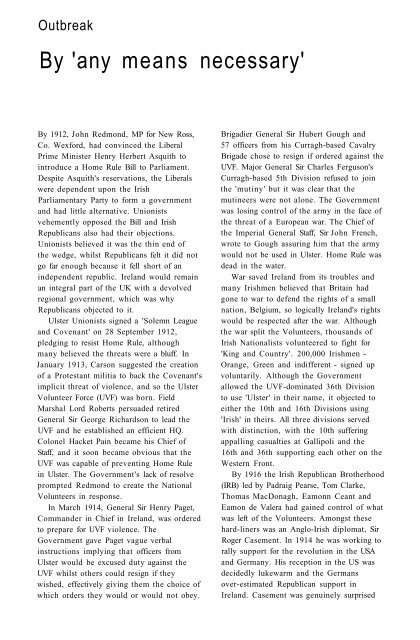Create successful ePaper yourself
Turn your PDF publications into a flip-book with our unique Google optimized e-Paper software.
Outbreak<br />
By 'any means necessary'<br />
By 1912, John Redmond, MP for New Ross,<br />
Co. Wexford, had convinced the Liberal<br />
Prime Minister Henry Herbert Asquith to<br />
introduce a Home Rule Bill to Parliament.<br />
Despite Asquith's reservations, the Liberals<br />
were dependent upon the <strong>Irish</strong><br />
Parliamentary Party to form a government<br />
and had little alternative. Unionists<br />
vehemently opposed the Bill and <strong>Irish</strong><br />
Republicans also had their objections.<br />
Unionists believed it was the thin end of<br />
the wedge, whilst Republicans felt it did not<br />
go far enough because it fell short of an<br />
independent republic. Ireland would remain<br />
an integral part of the UK with a devolved<br />
regional government, which was why<br />
Republicans objected to it.<br />
Ulster Unionists signed a 'Solemn League<br />
and Covenant' on 28 September 1912,<br />
pledging to resist Home Rule, although<br />
many believed the threats were a bluff. In<br />
January <strong>1913</strong>, Carson suggested the creation<br />
of a Protestant militia to back the Covenant's<br />
implicit threat of violence, and so the Ulster<br />
Volunteer Force (UVF) was born. Field<br />
Marshal Lord Roberts persuaded retired<br />
General Sir George Richardson to lead the<br />
UVF and he established an efficient HQ.<br />
Colonel Hacket Pain became his Chief of<br />
Staff, and it soon became obvious that the<br />
UVF was capable of preventing Home Rule<br />
in Ulster. <strong>The</strong> Government's lack of resolve<br />
prompted Redmond to create the National<br />
Volunteers in response.<br />
In March 1914, General Sir Henry Paget,<br />
Commander in Chief in Ireland, was ordered<br />
to prepare for UVF violence. <strong>The</strong><br />
Government gave Paget vague verbal<br />
instructions implying that officers from<br />
Ulster would be excused duty against the<br />
UVF whilst others could resign if they<br />
wished, effectively giving them the choice of<br />
which orders they would or would not obey.<br />
Brigadier General Sir Hubert Gough and<br />
57 officers from his Curragh-based Cavalry<br />
Brigade chose to resign if ordered against the<br />
UVF. Major General Sir Charles Ferguson's<br />
Curragh-based 5th Division refused to join<br />
the 'mutiny' but it was clear that the<br />
mutineers were not alone. <strong>The</strong> Government<br />
was losing control of the army in the face of<br />
the threat of a European war. <strong>The</strong> Chief of<br />
the Imperial General Staff, Sir John French,<br />
wrote to Gough assuring him that the army<br />
would not be used in Ulster. Home Rule was<br />
dead in the water.<br />
<strong>War</strong> saved Ireland from its troubles and<br />
many <strong>Irish</strong>men believed that Britain had<br />
gone to war to defend the rights of a small<br />
nation, Belgium, so logically Ireland's rights<br />
would be respected after the war. Although<br />
the war split the Volunteers, thousands of<br />
<strong>Irish</strong> Nationalists volunteered to fight for<br />
'King and Country'. 200,000 <strong>Irish</strong>men -<br />
Orange, Green and indifferent - signed up<br />
voluntarily. Although the Government<br />
allowed the UVF-dominated 36th Division<br />
to use 'Ulster' in their name, it objected to<br />
either the 10th and 16th Divisions using<br />
'<strong>Irish</strong>' in theirs. All three divisions served<br />
with distinction, with the 10th suffering<br />
appalling casualties at Gallipoli and the<br />
16th and 36th supporting each other on the<br />
Western Front.<br />
By 1916 the <strong>Irish</strong> Republican Brotherhood<br />
(IRB) led by Padraig Pearse, Tom Clarke,<br />
Thomas MacDonagh, Eamonn Ceant and<br />
Eamon de Valera had gained control of what<br />
was left of the Volunteers. Amongst these<br />
hard-liners was an <strong>Anglo</strong>-<strong>Irish</strong> diplomat, Sir<br />
Roger Casement. In 1914 he was working to<br />
rally support for the revolution in the USA<br />
and Germany. His reception in the US was<br />
decidedly lukewarm and the Germans<br />
over-estimated Republican support in<br />
Ireland. Casement was genuinely surprised



